Finding Neverland
 for mild thematic elements and brief language.
for mild thematic elements and brief language.
Reviewed by: Lucy Pinnington
CONTRIBUTOR
| Moral Rating: | Better than Average |
| Moviemaking Quality: |
|
| Primary Audience: | Adults Family |
| Genre: | Biography Drama |
| Length: | 1 hr. 46 min. |
| Year of Release: | 2004 |
| USA Release: |
September 4, 2004 (festival) November 12, 2004 (limited) November 24, 2004 (wide) |
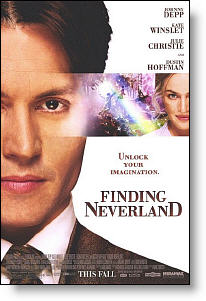
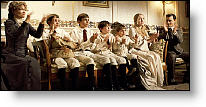

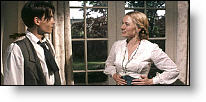
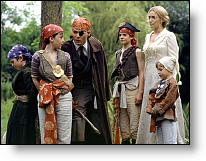
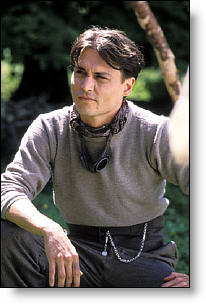
| Featuring |
|---|
|
Johnny Depp … Sir James Matthew Barrie Kate Winslet … Sylvia Llewelyn Davies Radha Mitchell … Mary Ansell Barrie Dustin Hoffman … Charles Frohman Julie Christie … Mrs. Emma du Maurier Freddie Highmore … Peter Llewelyn Davies See all » |
| Director |
|
Marc Forster |
| Producer |
|
Nellie Bellflower Richard N. Gladstein See all » |
| Distributor |
“Unlock your imagination”
“Finding Neverland” is a beautiful and moving story of a man who didn’t want to grow up and famously created the myth of Peter Pan, a boy who never grew up, immortalizing that precious stage of boyhood. The film is based on events surrounding the writing of Sir J. M. Barrie’s “Peter Pan” and its opening night in 1904.
Struggling with a cold and apparently unloving marriage as well as a career which shows distinct signs of flagging, James Barrie is drawn into a friendship with a family of four charming little boys and their beautiful mother. The Llewelyn Davies boys are also trying to come to terms with the death of their young father, and “Uncle Jim” soon becomes an important part of their family, restoring laughter and delight to their lives.
The idyllic summer that Barrie shares with the family fires in his imagination the plot and themes for his new, ground-breaking play “Peter Pan.” The audience gains fascinating glimpses into the creation of a script and the staging of a play, and we see how Barrie twists fact into fiction as he shapes his story and shares his childhood fantasy of Neverland first with Sylvia and her sons, and then with the world. Just as the story of Peter Pan is bitter-sweet, so Barrie and the Llewelyn Davies family discover that pretending does not make life easy, simple or safe.
While this film is rated PG, I would not be comfortable taking children below the age of about 12 to watch it. There is one outburst of mild swearing when Barrie is anxiously watching the audience’s frosty reception of his play “Little Mary,” but this comes right at the start of the film and could easily be missed. The themes of the movie, however, are adult: love and loss. Children and adults must cope with bereavement and do so in unpredictable ways; some of the strange, sudden transitions from “real-life” to fantasy might upset younger children (and these elements of magic realism also have an adverse impact on the believability of the film for more mature viewers). The adult emotions are complicated and often raw.
The scene play by David Magee allows the actors and actresses to show that emotions, motivations, and personalities are complex and subtle. Julie Christie plays Sylvia’s mother, Emma du Maurier, and while she is a nag—and we see Barrie transform her into Captain Hook in his imagination—ultimately she is a sympathetic character and all her actions are understandable: there are no villains in this piece.
The cinematography is beautiful: the film glows in a golden haze of Edwardian beauty, and the costumes and scenery just add to the charm and completeness of the world conjured up by director, Marc Forster.
The acting is excellent. Among the children, Freddie Highmore who plays young Peter Llewelyn Davies, is outstanding and acts his little heart out in a most affecting way. Depp’s portrayal of Barrie is sensitive and deceptively simple, portraying an essentially lonely man of whom his friend George Bernard Shaw wrote “for all his playfulness, he had hell in his soul.” Kate Winslet’s convincing Sylvia radiates strength as well as charm and beauty. Radha Mitchell who plays Mary Barrie renders perfectly the disappointed wife seeking for what she has lost. Dustin Hoffman and the many British actors who take cameos make watching the film a wonderful excuse for whispering “Oh look, it’s him!” to one’s neighbor.
From a Christian perspective, Barrie’s feelings for the widowed Sylvia might seem to be a case of committing adultery in one’s heart. Yet, it seems as if the childless and unhappy Barrie is more in love with the whole family than merely with the mother. One is left with the impression that whatever love lay between Sylvia and Barrie was the same sort of love Wendy had for Peter Pan, and there is nothing to raise a blush: even when Barrie visits her bedroom, it is to see her on her sick bed. The awful disintegration of the Barrie marriage is seen to be a shared responsibility, no doubt complicated by James’ committment to the Llewelyn Davies family, and a Christian viewer cannot help thinking that if only one of them had been strong enough to decide to love and serve the other in a truly Biblical way, either James or Mary could have saved and transformed their marriage. In reality, the Barrie’s marriage did end after Mary’s adultery, but it seems to have been an unhappy relationship from the start.
There was gossip in Barrie’s lifetime which is reflected in a delicately worded conversation in the film that “Uncle Jim’s” affection for the boys was unwholesome; but the film rejects this, indicating it was the very innocence of the children which made them perfect playmates for Barrie; the real Llewelyn Davies boys also repudiated similar slurs after Barrie’s death. This movie makes clear how much Barrie loved children: he is able to enter into the boys’ world and to play with them almost as a peer, and he keeps 25 seats free on the opening night of Peter Pan for the local orphanage to send a party of children: this reflects the true personality of the man who gifted the rights of Peter Pan, and the wealth they bring in, to the Great Ormond Street Hospital for children.
The imperfect nature of human love is also made clear in “Finding Neverland.” Not only do James and Mary fail to love one another in a complete and unselfish way, but we see that James’ love for the fatherless family is not completely altruistic, and, that, though he wishes for nothing but their good, his well-meaning involvement in their lives makes them victims of gossip and shunning. Even mother-love is shown to be flawed: a mother can harm her children by trying to protect them from truth, and similarly a mother can hurt her daughter by only seeking her best interests. While none of the characters appear to appreciate this, it is only Christ’s perfect and healing love which can be fully depended on and trusted.
Any reference to Christian hope and eternal security is completely missing from this film. For Barrie and his friends, “finding Neverland” is a metaphor for death and the after-life. We see a character make that journey to the grief of those left behind, and true comfort is completely absent as a child is assured that those who die can be found “on every page of your imagination.” It is tragic to think that the characters in the film believe that a made-up land full of fairies, mermaids, pirates, redskins, a clock-swallowing crocodile and a hoard of Lost Boys is the happiest and best destination after death.
Neverland is a happy place to imaginatively spend a summer afternoon, but it is not substitute for the bliss and joy of being in God’s presence in Heaven or the certainty of a bodily resurrection and an eternity in the New Earth the Bible promises. In a film where the boundary between make-believe and real-life is a central theme, it is sad and unsatisfying that the final reality of death and parting are shrouded in “let’s pretend” nonsense.
This is a film I want to watch again, and which we will add to our DVD collection. It made me laugh and it made me cry my eyes out—and even my husband was seen to covertly employ a handkerchief. While not a Christian film, it is one of the least objectionable films we have seen in a long time, and, despite its PG rating, is a movie which should be enjoyed on a deep and satisfying level by adult audiences. It is also a stunningly beautiful movie, evocative of that golden and long-disappeared Edwardian age and the golden and sadly fleeting days of childhood.
Violence: None / Profanity: Minor / Sex/Nudity: None


I have to agree with the reviewer that this isn’t a film meant for children. When I read the review before seeing the film, I was taken aback at the suggestion that children under twelve not be taken to see Finding Neverland (it is a film about Peter Pan after all!), but after seeing the film, I agree, mainly because I think that younger audiences would find the film boring and too slow.(There are also a few “thematic” elements. These, however, will not be noticed by many audience members and in my opinion, are not a reason for concern).
In response to Barrie’s philosophy that when people die they go to Neverland: I did not feel that this is entirely what he was saying. Rather, I think that Barrie was trying to convey the fact that memories last forever and that you can relive moments passed in your imagination. This was a slower-paced movie, so don’t be expecting rip-roaring action-there isn’t any per se. I would highly recommend this film!
[Good/5]
Death, the great enemy, is inescapable. One woman noted that the ticking crocodile is after all of us. If we draw the connection to leviathan and thus to chaos, the crocodile becomes a destructive, all consuming void. Neverland is not heaven, but it is a provisory heaven on Earth, only solopsistic, remaining in the mind.
It is an Eden sank to grief that its creator is attempting to maintain. Neverland is the unattainable goal, much like Utopia meaning nowhere. The emphasis here is placed on time over place. It is a poor substitute for paradise, but the author of this place is fully aware of this. It is tragic, not because he believes it is a substitution for heaven, but because there isn’t one in his opinion. See this film. It is an important barometer of our culture: one that is searching for, but not finding, Neverland.
[Better than Average/4]
He is reminded of the creative spirit of youth when he meets Sylvia’s, a young widow, (Winslet) boys. As he becomes an increasing part of their lives he formulates the characters and ideas that we now know as “Peter Pan.” “Neverland” is one of those special movies where you leave feeling inspired, just as Barrie was by others. Its heartfelt message to always look for inspiration is a refreshing change from so many films that seem recycled. I’m not sure how factual Barrie’s story was represented here, but the events that transpire throughout the film are as touching as they are fun to watch. This film is likely to bore most children except for some of the “magic” scenes, despite its subject matter and is meant for older teens and up.
On a side note, a negative interpretation that some may develop of this film’s premise is the appropriateness of the relationship between Barrie and Sylvia’s boys. It is mentioned in the film very subtly and an insulted Barrie denies the accusation. To clarify, this film supports that Barrie’s involvement in the childrens’ lives was that of a father figure. Lastly and somewhat disappointingly was the lack of interest Barrie and his wife shared for eachother. Yes, she is shrewish and arrogant and the plot device is used to further approve of Barrie’s absence from his home, but it was upsetting that the two never tried to work on their marriage.
To some, this may present the view that it is ok to just give up on something, if it isn’t perfect. However, these side notes do not affect one from enjoying this well acted, well directed and visually pleasing film.
[Better than Average/4½]
[Better than Average/5]
My friend and I agree that the JM Barrie character, while most likely not a Christian, displayed many Christian values and attributes. He was kind to others, gave freely, did not pretend to be someone he wasn’t, and never looked for something in return. His relationship with Sylvia was shown to be innocent. As an author, I was amazed at how Johnny Depp was able to protray us—I kept being shocked at things he would say or do… things I’d only thought real authors would know about. He certainly did his homework. His accent was right-on and amazing also, very charming and never overdone.
Mr. Depp gave one of his best performances of all time in this movie, and I can’t wait to see this movie again. I WOULD suggest this movie for the whole family!
[Better than Average/5]
As a Christian, I cringed when Barrie told a boy that someone that had died was now in “Neverland.” But, as “Neverland” is your imagination someone that has passed away can “live” in your imagination. Still, I don’t really think that that’s what he meant. Overall, I think it is a clean movie with issues that shouldn’t be a problem for adults.
[Average/4]
Moral rating: Better than Average / Moviemaking quality: 4
The Bible says in Philippians 4:8, if there be any praise (of God), think on these things. Also, what has Peter Pan don for this world? Not a thing. What has Jesus don for this world? Every thing you can think of. A film that glorifies Peter Pan and doesn’t even declare Christ or God is one that I can’t root for. Also, in real life Barrie was in love with the boy’s mother even before her husband died. Yuck! I DON’T recommend this film.
[Very Offensive/4½]
I wouldn’t show this movie to children. In fact, don’t watch it at all! It’s not worth it. It’s off-the-wall, (from what I hear, pretty faithful to what J.M. Barrie was like in real life!) and a waste of time. Rather interesting, but there are lots of other cleaner, and more sensible movies to watch!
[Average/2½]
[Good/5]
[Good/5]
[Excellent!/4½]
I’ll admit that at the end, when Barrie and Peter are discussing death, there is a bit suggestion that Neverland replaces Heaven, but I don’t think that’s what Barrie meant. What he meant was that you can keep someone alive in their memories, and he thought the best way to describe that to a little boy was through Neverland. I especially liked how Barrie could bring stuff from real life to the story—such as the idea for Hook from the grandmother when she was telling the boys they weren’t going out the next day, or the way that he named several characters after real people, like Peter as Peter Pan, George [one of the boys] as Wendy’s father, Michael and John [two other brothers] as Wendy’s brothers, and so on.
I disagree, however, with the review writer: only teenagers and adults should see this. I’m eleven, and I saw nine year olds see this and they loved it. I didn’t cry when I saw it—I don’t cry much at all, really - but many others did, and I have to admit that they had a reason to.
Anyway, I think it was a really great film and that everyone should see. It warms your heart and really gets you to thinking, not to mention it tells a wonderful story. Hats off to Johnny and Kate and the boys and, well, all actors and actresses (I enjoyed Angus Barnett, even though his part was small). Full marks!
[Excellent/5]
[Good/4½]
[Excellent/5]
A majority of this conversation between Barrie and Peter is simply discussing how to deal with grief. Barrie tells Peter that [a person who died] is on “every page” of Peter’s journal, and that that is how he can remember the individual who died. He does discuss Neverland; however, it is important to remember that Neverland is an imaginary place—it is a land of make-believe stored in the imagination.
What Barrie tells Peter is that just as Neverland is a place in your imagination, you can also keep the memory of someone dead alive in your imagination. When you miss them, you can remember all the lovely adventures and escapades with them, and deal with the grief this way. I am generally very sensitive to non-Christian elements in movies and I see how this scene could be interpereted as being unbiblical. Even when I was watching this scene, I was VERY wary of what the characters were “really” saying—that said, I came out of the movie agreeing with what Barrie told Peter because I interpreted it as not referring in any way to heaven.
[Good/4½]
In the end, I think that, if Neverland is meant to be “heaven” then it is a flawed idea, but if it is merely an analogy used by Barrie to explain to Peter a way to deal with sadness, it’s not unbiblical, nor is it bad advice. Of course, there is no reference to God in the movie (is that really surprising from a Hollywood film?) but I didn’t feel that the movie was blatantly unbiblical either.
Note: this scene would be a great conversation starter for families after seeing the movie. I know my family had this discussion—I took the view expressed above while my Mom interpreted “Neverland” as being a “substitute” for heaven and therefore, a wrong idea. I feel that the movie left this scene open to interpretation, and that how you choose to interpret this scene it is simply a matter of opinion. I DO recommend this film to preteens, teens and adults.
[Better than Average/5]
[Good/5]
Finally, in last scene, after we been told to believe a dozen times, when Peter is told that his parent is in Neverland they could have said that they had believed that Christ was their Savior and their sins were forgiven and that they were in Heaven where there was never any tears there. In last few years Hollywood has gives us parts of the Gospel message, “Tuck Everlasting” to “Master and Commander” and “Gods and Generals” have, but not “Finding Neverland.”
Yes, this film is pretty clean, and the acting is good, but it has too many worldviews and doesn’t give God the glory: so I can’t honestly recommend this film to Christian families. In the end if I was crying it was because I was thing about how they had come so near to telling the world about God’s love.
[Very Offensive/4]
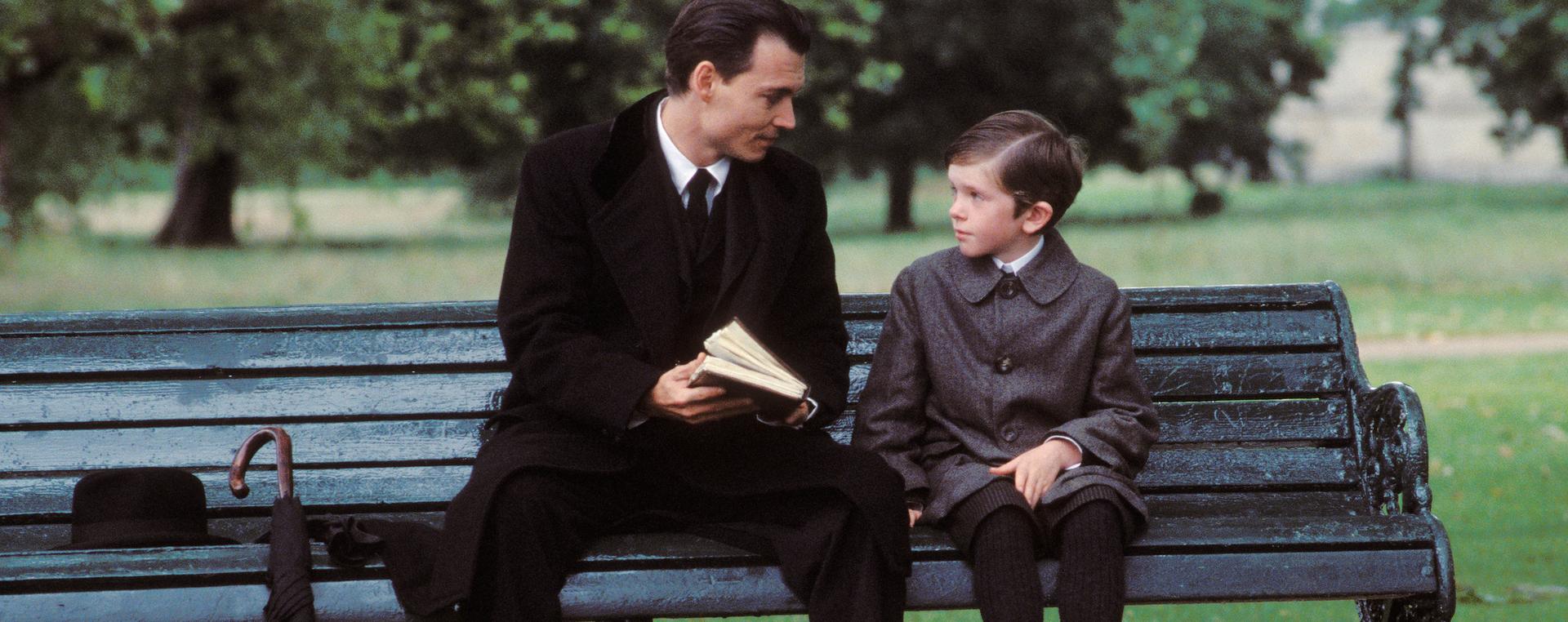




We can learn a lot from children; imagination, their love, and their not caring what the rest of the world thinks. From a secular perspective, the movie was excellent. The acting was simply amazing-I loved the little kids! Johnny Depp here was the polar opposite of his character in Pirates-showing his incredible range and talent. His accent was great-one could not tell that he is an American.
I even cried, and so did my tough guy friend. We bawled like little babies and it was so embarrassing but fun at the same time. This movie will make you laugh, cry, and imagine at the same time! I do not recommend this to kids-it would simply be boring, except for a few scenes.
My Ratings: [Good/5]